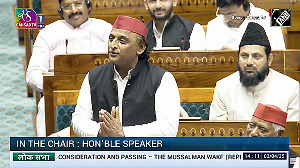Creating a positive reform that does away with an official who constitutes a flawed aspect of Indian democracy will allow the BJP to rightfully claim this as one of its positive legacies, suggests Karan P Shah.

The Bharatiya Janata Party should commit to abolishing the post of governors in its manifesto for the upcoming elections.
If it wins the 2024 elections, such a Constitutional amendment is likely to get cross-party support and easily pass.
Making this policy commitment seems to be counterintuitive but, on closer examination, it has several benefits.
Firstly, for the BJP to effectively govern in a federal system it's ideal to have good relationships with Opposition parties who rule a chunk of Indian states.
Relationships between the BJP and the Opposition are extremely bad for a variety of reasons, one of them being the politicised nature of governors.
Committing to do away with governors will be a significant concession that Opposition parties will appreciate.
While it certainly will not be enough to significantly improve relationships, given the multitude of perceived grievances that the Opposition has with the BJP, it will be a step in the right direction which can lead to an improvement in the efficacy of governance which has to the key aim of the ruling party.
Secondly, governors today have no role to play in a democracy.
Voters in a state elect members of legislative assemblies who in turn elect a chief minister who governs them.
While it could be claimed that governors should play a role in a assessing the Constitutional validity of bills passed by the legislature, this should be actually be the role of the judiciary.
Governors are unelected officials, imposed by the central government, creating a parallel power structure.
The BJP can better deliver on its maxim of Minimum Government, Maximum Governance and rebut some of the criticism about democratic backsliding by doing away with governors.
Understanding the Constitutional role of governors and their history will help elucidate why the role of governors should no longer exist.
Dr B R Ambedkar, chairman of the drafting committee of the Constitution, said the role of a governor was similar to the role of the President.
The governor was expected to be the Constitutional head of the state, a vital link between the Union government and the state government and, above all, impartial and independent.
The position of the governor was less controversial for the first 20 years after Independence, largely because of the complete dominance of the Congress.
The Union government has since then abused the office of the governor to achieve its political ambitions especially during the 1970s when elected state governments were dismissed on whims.
The Sarkaria Commission was set up in 1983 to examine the relationship and balance of power between state and central governments in the country and suggest changes within the framework of the Constitution.
The report, published in 1988, had several good suggestions such as ensuring that the governor is appointed in consultation with the chief minister and should not be someone in active politics.
Unfortunately, most of the Commission's suggestions were ignored and the misuse of governors continued even during the United Progressive Alliance's ten-year term when the BJP was largely the victim of governor malpractice.

In continuation of this anti-democratic trend, the BJP has also egregiously used governors to achieve its own purposes.
Firstly, its appointed governors' have prevented government formation when Opposition parties have had a majority and instead unfairly invited the BJP to form the government.
For example, after the 2018 Karnataka assembly elections, the governor invited the BJP to form the government despite the Janata Dal-Secular and Congress post-poll alliance having a majority.
This was done presumably with the intention of enticing Opposition MLAs to defect.
Secondly, its governors have consistently made life difficult for elected governments by acting with extreme partisan zeal and interfered with the functioning of their governments.
Thirdly and most regrettably, governors have also not let governments legislate by indefinitely sitting on laws passed instead of signing them into action.
The Supreme Court recently repudiated Kerala Governor Arif Mohammed Khan for sitting on bill passed for over two years and the BJP's action has faced criticism from the highest court for a similar issue in Punjab where the Supreme Court observed 'the power to make decisions affecting the governance of the State, or as the case may be of the nation essentially lies with the elected arm of the government. The governor is intended to be a Constitutional statesman, guiding the government on matters of Constitutional concern.'
The BJP is a hegemonic position today, but no political party stays in power forever.
It will at some point be in Opposition and will then find governors being used aggressively against it.
Hence now, when the BJP is on top, is an opportunity to remove a system bad for democracy and which has been broken for decades.
The party also is planning an ambitious reform of One Nation One Election to synchronise all elections across the country.
Much of the Opposition is already up in arms about this proposal.
They will certainly be even more so if state elections are delayed till a uniform election date while they are being ruled by unelected and partisan governors.
Creating a positive reform that does away with an official who constitutes a flawed aspect of Indian democracy will allow the BJP to rightfully claim this as one of its positive legacies.
Karan P Shah is the co-founder of grow-trees.com and a political commentator. He holds an MBA from the Harvard Business School.
Feature Presentation: Aslam Hunani/Rediff.com











 © 2025
© 2025